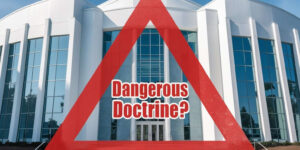Why I Cannot Accept the Ice Bucket Challenge
Recently, I’ve received a few “ALS ice bucket challenges,” which I cannot accept. I don’t fault any of my friends for giving me this challenge. Thanks for thinking of me and trying to include me! Really. You guys are awesome, and it was really fun watching you shiver!
Amytrophic lateral sclerosis (ALS), more popularly known as Lou Gehrig’s disease, is a horrible neurodegenerative disease affecting everything from speech and swallowing to basic mobility. I personally have friends whose parents have languished and died from this disease, and experts estimate that 30,000 Americans suffer from this disease. It’s as good a place as any to focus medical-research efforts.
But I cannot accept the challenge, and I hope you’ll understand why. It’s not because I’m afraid of cold water. (Although that’s true). My concern is where the publicity and money might go. Specifically, I’m concerned with the kind of research that might be financed by my hypothetical promotional activity. (For those who don’t know what this is, you’re supposed to dump a bucket of ice water on your head, and video it, and then challenge others to do it. If you don’t do it, you’re supposed to give $100 to the ALS Association, and if you do do it, you either don’t have to give any money to the ALSA or you’re supposed to give $10 to the ALSA, depending on the version).
The ALS Association funds a number of different types of research, and among these is embryonic stem-cell research. For those who don’t know what this is, it is when scientists take a female egg and a male sperm and fertilize the egg in a lab, and then after the new life begins to form, they remove the building blocks of life—embryonic stem cells. This is the same process that occurs when people struggle with infertility and then get in-vitro fertilization. The important difference is that instead of implanting the fertilized embryo into a mother so that it can grow into a baby, these embryos are experimented on, and then discarded. They are created for the express purpose of destroying them for medical research.
The ALS Association website says this: “Adult stem cell research is important and should be done alongside embryonic stem cell research as both will provide valuable insights. Only through exploration of all types of stem cell research will scientists find the most efficient and effective ways to treat diseases.”
Sometimes, stem cells are harvested as part of in-vitro fertilization as described above, and other times they are harvested as part of an abortion procedure. For example, one clinical trial, which was supported by the ALS Association with a $500,000 grant involved “stem cells … from the spinal cord of a single fetus electively aborted after eight weeks of gestation.”
At eight weeks, a baby has its own unique DNA, is 2 centimeters long, has tiny fingers and toes, and a heart beat of about 160 beats per minute.
Some might argue that life does not begin at conception. But the other options seem entirely subjective scientifically and unsupported biblically. Some say life begins not at conception, but implantation or even birth—as if the location of the embryo should determine when it is alive. Some say that it’s when the embryo is viable, but this point is completely subjective and would mean that now life begins far sooner than it did a few years ago when we didn’t have the technology to save early preterm infants.
At conception, a baby has a unique genetic code, and all of the necessary building blocks for life, and the Bible attributes the properties of personhood to us from conception (see Ps. 139:13-16, Job 10:8-12, Jer. 1:5, Ps. 51:5, Luke 1:39-44, Ex. 21:22-24).
The reason this is important is because as a Christian, I believe that no human life is intrinsically worth more than another human life. All humans are created in the image of God (Gen. 1:27, 9:6), and therefore are uniquely valuable and have distinctive worth.
We’re not all born “equal” in the sense that we’re all able to run equally fast or complete math problems equally well, but we are all equally created in the image of God, and this is where we derive our worth and value.
The problem with embryonic stem-cell research is two-fold: First, it is morally reprehensible to anyone who believes that life begins at conception. Imagine the outrage that would happen if scientists proposed we grew infants and children for the express purpose of performing lethal experiments on them, no matter how scientifically helpful the results would be.
Secondly, if there is a breakthrough involving embryonic stem-cell research, then the resulting treatment would involve mass harvesting of embryonic stem cells, and therefore mass abortions. In short, embryonic stem-cell research involves the destruction of innocent human life. And therefore, I cannot promote donations to this particular organization when it thinks that infanticide is a legitimate way to save other human beings.
Now, I don’t think our response as Christians should be to just throw up our hands, check out, and not do anything. Instead, we should lead the way in helping those who are suffering with ALS and work toward finding medical treatments that are ethically researched. So, I would ask anyone who is making a donation to consider donating to an ethically focused organization, such as the John Paul II Medical Research Institute.
Finally, as one blogger on this issue said: “This is a good time to consider the effect that social-media activism is having on our culture—and ourselves as actors in it. … I very much believe in this medium’s capacity for acting as a vehicle for good, yet I also recognize how instant connectivity is a double-edged sword, making it much easier for a ‘herd mentality’ to develop. Which is all fine and good when the herd is headed in the correct direction, right?
“But peer pressure blows perspective out of the water, as we race to belong without first stepping back and considering each and every dimension before clicking ‘Like’ or share. How many of you stopped and investigated HOW your money would be spent before emptying the ice-cube trays? Exactly. You shouldn’t feel bad about it! That’s not my point. You should feel a little weird and more than a little prone toward caution in the future.
“So don’t look at this as a call for inaction. I’m asking you to be as active as ever and creative, too; what we’re looking for is a higher level of self-awareness the next time a Facebook buddy tags you with the best of intentions.”
Nathanael King is an associate pastor at Temecula Hills Christian Fellowship in Temecula, California. This article originally appeared on the author’s blog, which is at nathanaelk.com.






































